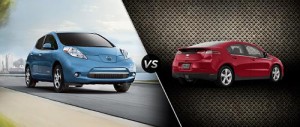
SAN ANTONIO — The future of driving is present with the launch of vehicles like the 2014 Nissan LEAF and 2014 Chevy Volt. Running entirely on electric power, the LEAF is working to redefine the way drivers travel and consume fuel. The same can be said about the Volt hybrid and its ability to run on both a gas engine and lithium-ion battery. While the vehicles operate on distinct power sources, the vehicles fundamentally share the goal of providing drivers with stronger, uncompromising efficiency.
While comparing a hybrid to an electric vehicle may seem like comparing an apple to an orange it is important for drivers to educate themselves on the strengths and capabilities of two of the most significant styles of fuel-saving vehicles.
The benefit of a hybrid powertrain is its ability to use a gas engine for long-distance travel and electricity for cleaner city driving. When the Volt operates on its lithium-ion battery, it earns a 38-mile driving range. When the electric power works in conjunction with the vehicle’s gas engine, the Volt can travel up to 380 miles on a single tank of gas.
Frequent travelers may benefit from a hybrid’s longevity, but if a driver’s ultimate goal is to perform more efficiently on the road, the 2014 Nissan LEAF’s 100-percent electric powertrain is the undeniably smarter option. Running exclusively on an advanced lithium-ion battery, the LEAF produces zero CO2 emissions or fumes when in motion. Drivers are able to charge the vehicle at home or at designated charging stations across the country. The result is an 84-mile driving range and Environmental Protection Agency (EPA)-estimated 126 mpge city efficiency rating.




